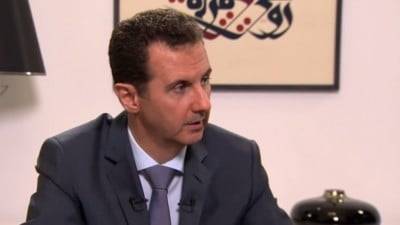US, Turkey Angered by Assad’s ‘Red Carpet’ Visit To Moscow

The US and Turkey, two of the Syrian President Bashar Assad’s key opponents, have not cheered his visit to Moscow, with the White House slamming it as a “red carpet welcome.” Russian and Syrian leaders were meeting for crisis consultations and planning.
The White House criticized the way the Syrian leader was received, saying it resembled a “red carpet welcome.” In that same statement, the US also accused Assad of using chemical weapons against his own people and questioned Russia’s interests in a political transition of power in Syria.
“We view the red carpet welcome for Assad, who has used chemical weapons against his own people, at odds with the stated goal by the Russians for a political transition in Syria,” White House spokesman Eric Schultz said.
Assad has stressed on multiple occasions in the past that Western claims that his government had used chemical weapons against the Syrian population are “an insult to common sense” and “nonsense.”
The State Department added that it was not shocked by Assad’s visit to Moscow considering the relationship between the two countries. “It’s not surprising that Bashar Assad would travel to Moscow, given the relationship that Syria has with Russia, and given the recent military activities by Russia in Syria on behalf of Bashar al-Assad,” State Department spokesman John Kirby said at a briefing.
In addition, Turkish Prime Minister Ahmet Davutoglu offered sarcastic comments on the topic, stating Assad should have“stayed in Moscow” in order to kick start the transition process.
#ISIS camp in Istanbul trained children as terrorists https://t.co/mg0899SQoy pic.twitter.com/LTu7qb6JXI
— RT (@RT_com) October 20, 2015
“If only he could stay in Moscow longer, to give the people of Syria some relief; in fact he should stay there so the transition can begin,” Davutoglu told reporters. Davutoglu once again reiterated that resolving the crisis in Syria should be about Assad’s departure and not about a transition with him remaining in power. Both the US and Turkey are meeting Russia for negotiations on Friday, along with Saudi Arabia. The foreign ministers of all four countries have also agreed to meet for talks on Syria in Vienna. Despite the negative rhetoric, these are concrete steps being taken by key players to resolve the crisis in Syria, perhaps signaling a positive shift, RT’s Egor Piskunov said. “It is quite rare that these key players in the Syrian crisis come together, especially Saudi Arabia, which has been on the side of the rebels fighting against Assad all along, and now they may be talking about a transition,” Piskunov said in a news report. “If we are looking at the creation of a new diplomatic quartet here on Syria, perhaps eventually the Syrian government even may be included into a political resolution of this crisis.”
Russian President Vladimir Putin and his Syrian counterpart Bashar Assad held talks in Moscow on Tuesday. “Yesterday evening Syrian President Bashar Assad arrived in Moscow for a working visit,” Kremlin spokesman Dmitry Peskov said on Wednesday. “President [Putin] was informed in detail by his Syrian counterpart about the current state of affairs in Syria and the long-range plan.” Syria is a country friendly to Russia, and Moscow is ready not only to assist with fighting terrorism, but also in reaching a peaceful political settlement to the Syrian conflict in cooperation with other global and regional powers, Russian President Vladimir Putin said. “The decisive word, without any doubt, must belong solely to the Syrian people,” Putin stressed. The Russian President and his Turkish counterpart, Recep Tayyip Erdogan, talked about Assad’s trip following the visit. “The situation in Syria was discussed,” Peskov said. “In this context, the leader of Russia informed his Turkish counterpart about the results of Syrian President al-Assad’s visit to Moscow.”
#Assad to #Putin at Moscow talks: Terrorists would seize larger areas if Russia did not act https://t.co/moG68qVz6L pic.twitter.com/QeyxZReqXM
— RT (@RT_com) October 21, 2015
The two leaders conducted lengthy negotiations, which then continued in the presence of Russia’s top policymakers.
Some experts have been suggesting that the West needs to reconsider its position on Assad if it wants to solve the crisis in Syria. Middle East journalist Karin Leukefeld told RT that Assad’s visit to Moscow needs to be viewed as the Syrian leader showing his willingness to negotiate.
“He wants to signal that he is ready to go outside his country to talk and to find a solution for his country and for the Syrian people. I think it is something the West should consider … The West needs to find a face-saving way to change their political line and to change their attitude towards Syria and to the Syrian president,” Leukefeld said.

